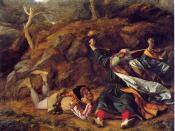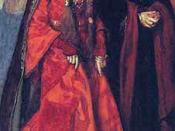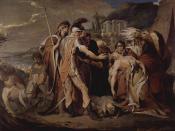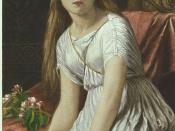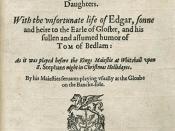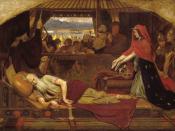The role of a fool, or court jester in the Elizabethan times, was to professionally entertain others, specifically the king. In essence, fools were hired to make mistakes. Fools may have been mentally retarded youths kept for the court's amusement, or more often they were singing, dancing stand up comedians. In Shakespeare'sKing Lear the fool plays many important roles. When Cordelia, Lear's only well-intentioned daughter, is banished from the kingdom Fool immediately assumes her role as Lear's protector. The fool is the king's advocate, honest and loyal and through his use of irony sarcasm and humour he is able to point out Lear's faults. Functioning much as a chorus would in a Greek tragedy, the fool comments on events in the play, the king's actions and acts as Lear's conscience. As he is the only character who is able to confront Lear directly without risk of punishment, he is able to moderate the king's behaviour.
He holds dramatic importance by helping the reader and/or Shakespeare's audience to understand what lies benefit the surface of certain actions and events. The Fool plays an essential and necessary role in developing King Lear's character.
At the start, King Lear already exemplifies signs of insanity. It may be wise to divide his kingdom for only that reason. Although, not trusting Cordelia is a sign of insanity for she is the only daughter that truly loved him. During entire time the Fool attempts to delay Lear's insanity and point out those reckless actions. Although he tries to prevent Lear from madness, be does not directly tell him he is going insane, "[t]hen I prithee by merry; thy wit shall not go slipspod" (I. V. 11-12). The remains at Lear's side even though Lear's insanity causes him discomfort.
Blow, winds, and crack your cheeks! Rage, Blow,You cataracts and hurricanes, spoutTill you have drenched our steeples, drown the cocks!You sulphurous and thought-executing fines,vaunt-couriers of oak-cleaving thunderbolts,Singe my white head; and thou all-shaking thunder,â¦(III. II. 1-5)The Fools proves he believes his well-being is not important to helping the King, confirming his loyalty and how much the king trusts the fool.
The Fool resumes Cordelia's role as the child at her absence. This acts as a constant reminder of Lear's foolishness in banishing her. The Fool and Lear share a close relationship, opposing to the many relationships that turn sour. Lear treats the fool with affection, as well as providing him protection just as if he were his own. He even exhibits his parental instincts in Act III scene II, "Come on my boy. How dost my boy? Art cold?" (III. II. 69). When Lear is unable to hear the truth from most of his advisiors, the Fool warns about Goneril and Regan, "Truth's a dog must to kennel. He must be whipped out when the Lady BRrach may stand by th'fire and stink" (I. IV. 110-112). The most evident association between Condelia and the Fool, though, is made at the end of the play. Lear loses Cordelia and exclaims, "And my poor fool is hanged." (V. III. 289). This implies death of the Fool rather than clearly being Cordelia, even though the Fool's fate is never explicitly explained. One may notice that the Fool and Cordelia never participated in the same scene; suggesting that Cordelia could have been the Fool in disguise, however there is no concrete evidence to prove this theory.
The Fool is fiercely loyal to the King, as the most intelligent and insightful character he provides simple and clear reasoning. Examinations of the Fool reveal his character personifies truth and reasoning; the things Lear lack. The Fool communicates in riddles and jokes to convey his messages to Lear. From the very first appearance the Fool is a very ironic character and that makes fun. Kent is one that receives his sarcastic remarks and phrases, "â¦thou must needs wear my coxcomb," (I. IV. 104) telling him that he is a Fool for remaining loyal to the since Lear gave everything away and became now worth following. Yet he simply remarks the truth of people around King Lear. He assists Lear by pointing out certain tails about people, and even the Lear's very own flaws. When Goneril gives Lear a taunt to get rid of his troops or to get out, Lear decides to head for shelter at his daughter, Regan's residence. The Fool acts in response by saying, "Shalt see thy other daughter will use the kindly; for though she's as like this as a crab's like an apple, yet I can tell what I can tell" (I. V. 14-16), meaning Regan would also treat you the same as Goneril. The Fool says that Regan would treat you kindly, even though she is similar to Goneril, he knows that Regan would taste just like Goneril - both f them sour crabapples. Later in the play, the Fool foreshadows what may happen, "[f]or you know, nuncle, the hedge-sparrow fed the cuckoo so long that it's had it head bit off by it young" (I. IV. 198-200). Also, the Fool attempts to open Lear's eyes for him to become able to see for himself, "[t]hou shouldst have been old till thou hadst been wise," (I. V. 42) and have insight as to why these events are occurring. The Fool never leaves the King's side even when Lear is going to Regan's house he pleads. "Nuncle Lear, Nuncle Lear, tarry take the fool with thee" (I. IV. 298-299). However, when he leaves he never returns, because he is no longer needed. The Fool mentions, "[a]nd I'll go to bed at noon" (III. IV. 84), that last we hear of him. The Fool means that everything is in chaos that he is going to 'bed at noon.' He leaves because Lear has gained the insight he needs and is capable of seeing things for himself now; the Fool's purpose is served.
The name Fool means nothing. As the most intelligent and insightful character and provides simple and clear reasoning for a King with limited vision. The Fool is loyal to the bitter end and provides the little bits of humour, much needed in the play; he has honesty and integrity that is found in only a few other characters in this play. Lear only has come to realization of who people are and reality because of the Fool. The Fool sustained Lear's sanity as long as he could in order to aid him to see the truth clearly. In the end, Lear appears as a father, a man that the audience can feel pathos for. When the Fool accomplished his mission to helping Lear gain his insight he vanishes. Lear may have gone insane much earlier if it was not for the Fool's influence. The fool is the key factor to Lear's evolutional changes.
Shakespeare, King Lear. New York: New American Library, of a division of Penguin Group Inc., 1998. Print.
